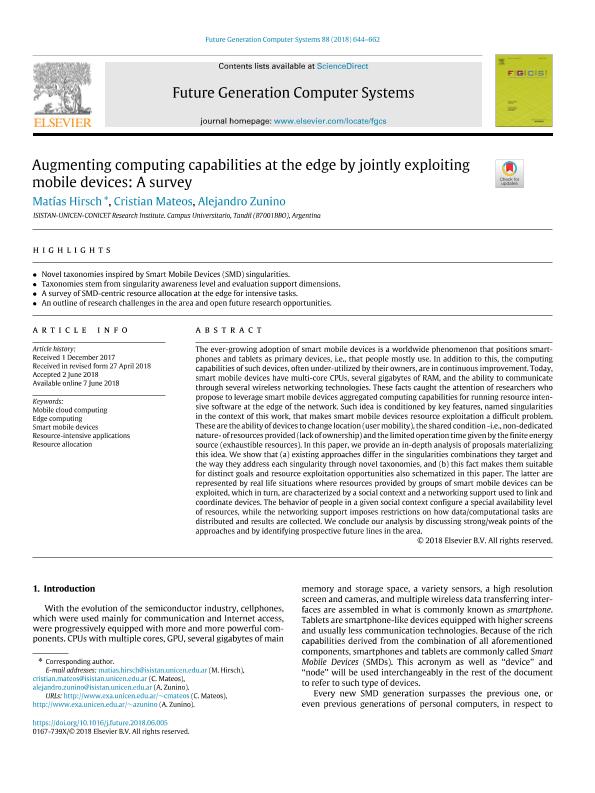Mostrar el registro sencillo del ítem
dc.contributor.author
Hirsch Jofré, Matías Eberardo

dc.contributor.author
Mateos Diaz, Cristian Maximiliano

dc.contributor.author
Zunino Suarez, Alejandro Octavio

dc.date.available
2019-11-29T19:38:39Z
dc.date.issued
2018-11
dc.identifier.citation
Hirsch Jofré, Matías Eberardo; Mateos Diaz, Cristian Maximiliano; Zunino Suarez, Alejandro Octavio; Augmenting computing capabilities at the edge by jointly exploiting mobile devices: A survey; Elsevier Science; Future Generation Computer Systems; 88; 11-2018; 644-662
dc.identifier.issn
0167-739X
dc.identifier.uri
http://hdl.handle.net/11336/91007
dc.description.abstract
The ever-growing adoption of smart mobile devices is a worldwide phenomenon that positions smartphones and tablets as primary devices, i.e., that people mostly use. In addition to this, the computing capabilities of such devices, often under-utilized by their owners, are in continuous improvement. Today, smart mobile devices have multi-core CPUs, several gigabytes of RAM, and the ability to communicate through several wireless networking technologies. These facts caught the attention of researchers who propose to leverage smart mobile devices aggregated computing capabilities for running resource intensive software at the edge of the network. Such idea is conditioned by key features, named singularities in the context of this work, that makes smart mobile devices resource exploitation a difficult problem. These are the ability of devices to change location (user mobility), the shared condition -i.e., non-dedicated nature- of resources provided (lack of ownership) and the limited operation time given by the finite energy source (exhaustible resources). In this paper, we provide an in-depth analysis of proposals materializing this idea. We show that (a) existing approaches differ in the singularities combinations they target and the way they address each singularity through novel taxonomies, and (b) this fact makes them suitable for distinct goals and resource exploitation opportunities also schematized in this paper. The latter are represented by real life situations where resources provided by groups of smart mobile devices can be exploited, which in turn, are characterized by a social context and a networking support used to link and coordinate devices. The behavior of people in a given social context configure a special availability level of resources, while the networking support imposes restrictions on how data/computational tasks are distributed and results are collected. We conclude our analysis by discussing strong/weak points of the approaches and by identifying prospective future lines in the area.
dc.format
application/pdf
dc.language.iso
eng
dc.publisher
Elsevier Science

dc.rights
info:eu-repo/semantics/openAccess
dc.rights.uri
https://creativecommons.org/licenses/by-nc-nd/2.5/ar/
dc.subject
EDGE COMPUTING
dc.subject
MOBILE CLOUD COMPUTING
dc.subject
RESOURCE ALLOCATION
dc.subject
RESOURCE-INTENSIVE APPLICATIONS
dc.subject
SMART MOBILE DEVICES
dc.subject.classification
Ciencias de la Computación

dc.subject.classification
Ciencias de la Computación e Información

dc.subject.classification
CIENCIAS NATURALES Y EXACTAS

dc.title
Augmenting computing capabilities at the edge by jointly exploiting mobile devices: A survey
dc.type
info:eu-repo/semantics/article
dc.type
info:ar-repo/semantics/artículo
dc.type
info:eu-repo/semantics/publishedVersion
dc.date.updated
2019-10-21T20:04:24Z
dc.journal.volume
88
dc.journal.pagination
644-662
dc.journal.pais
Países Bajos

dc.journal.ciudad
Amsterdam
dc.description.fil
Fil: Hirsch Jofré, Matías Eberardo. Consejo Nacional de Investigaciones Científicas y Técnicas. Centro Científico Tecnológico Conicet - Tandil. Instituto Superior de Ingeniería del Software. Universidad Nacional del Centro de la Provincia de Buenos Aires. Instituto Superior de Ingeniería del Software; Argentina
dc.description.fil
Fil: Mateos Diaz, Cristian Maximiliano. Consejo Nacional de Investigaciones Científicas y Técnicas. Centro Científico Tecnológico Conicet - Tandil. Instituto Superior de Ingeniería del Software. Universidad Nacional del Centro de la Provincia de Buenos Aires. Instituto Superior de Ingeniería del Software; Argentina
dc.description.fil
Fil: Zunino Suarez, Alejandro Octavio. Consejo Nacional de Investigaciones Científicas y Técnicas. Centro Científico Tecnológico Conicet - Tandil. Instituto Superior de Ingeniería del Software. Universidad Nacional del Centro de la Provincia de Buenos Aires. Instituto Superior de Ingeniería del Software; Argentina
dc.journal.title
Future Generation Computer Systems

dc.relation.alternativeid
info:eu-repo/semantics/altIdentifier/doi/https://doi.org/10.1016/j.future.2018.06.005
dc.relation.alternativeid
info:eu-repo/semantics/altIdentifier/url/https://www.sciencedirect.com/science/article/pii/S0167739X1732767X
Archivos asociados
